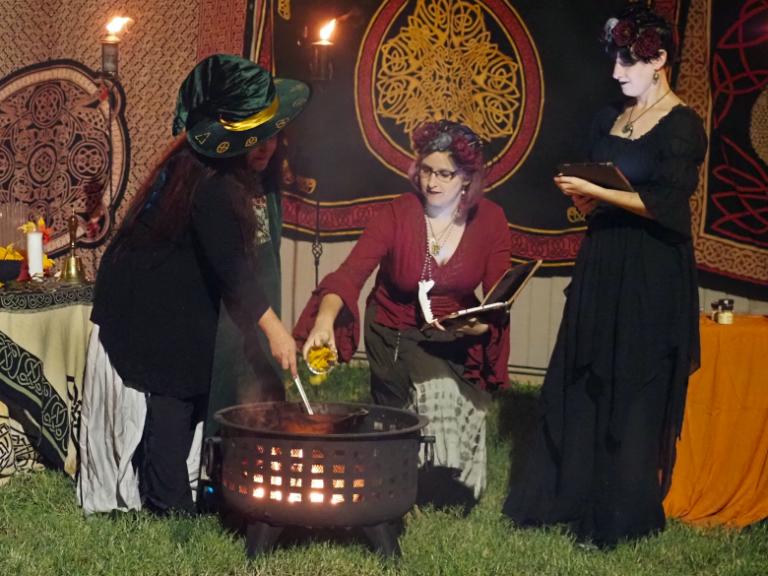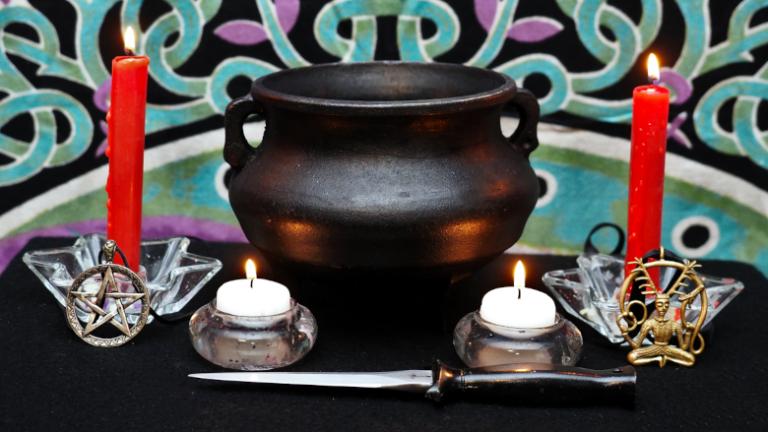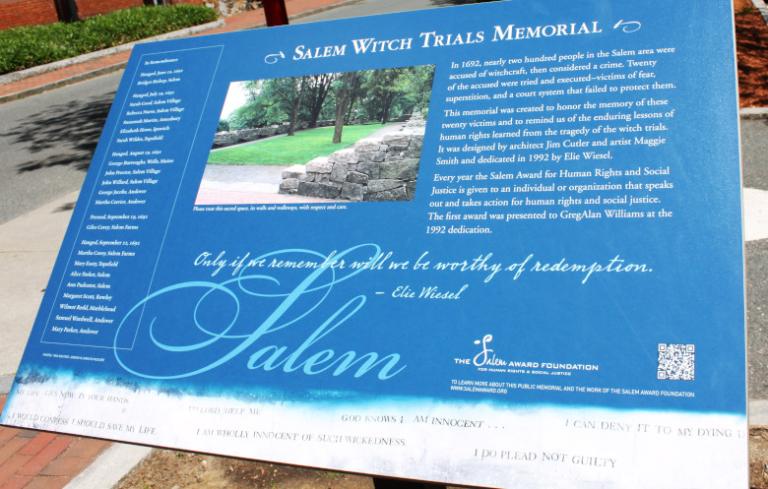I had a busy Fourth of July, but not too busy to do a bit of surfing around the Pagan internet. I came across two separate things that got my attention, both on the same theme.
The first was a Twitter fight started by someone who insisted that “witchcraft is all about healing.” I’m not going to link to it – we’ve seen hundreds of these arguments and this one adds nothing new. It’s one example of an idea that’s quite common these days: that witchcraft is good and light… and safe.
Then I came across this excellent essay by Ian Chambers of the “By The Pale Moonlight” blog titled Remembering the Witch in Witchcraft. I encourage you to read the whole thing for yourself – I’m going to include two brief excerpts here. It begins with:
Has modern witchcraft forgotten the Witch? Modern witchcraft is many things – ask a dozen witches and you’ll get two dozen definitions. It’s religion, it’s folk magic, it’s nature worship, it’s seasonal veneration, it’s Pagan, it’s Christian, it’s healing, midwifery and rude medicine… And yet, in all this reclaiming, repackaging to suit modern dispensation, have we left the old, feared Witch behind?
And it ends with:
In every culture in every time, the Witch hovers at the threshold, a threatening presence to consensus society, cultural conditioning, a danger to our previous tightly held worldview who mustn’t be allowed in.
Before presenting my own thoughts on this, I want to repeat something I say frequently: I have no interest in arguing over who is or isn’t a witch. If you don’t see yourself in my definition of witchcraft, then you’re simply a different kind of witch. My purpose is to present a particular viewpoint, and then to work with those who share that viewpoint to deepen our understanding, and our skills.
But Ian Chambers has a good point, and those who say “witchcraft is all about healing” are missing something very important.
Witchcraft is unauthorized magic
We need a working definition of witchcraft. I prefer an anthropological definition that is oversimplified but still useful: witchcraft is unauthorized magic.
Every society has approved magic: what the priests and politicians do – and in our society, the advertising executives. They may not call it magic, but that’s what it is: creating change in conformance with will. It’s strictly limited to approved activities and authorized persons.
Every society also has those who work magic outside those prescribed boundaries. The cunning women and men. The practitioners of non-mainstream religions. Those who practice the official religion in unapproved ways. These are the people who are called witches as a way of labeling them as “the Other” – and therefore dangerous.
Calling yourself a witch would be unthinkable to anyone prior to Margaret Murray. We’ve reclaimed the word, which is good. But in doing so, we’ve also watered it down.
Again, if you call yourself a witch and your practice is all about healing, so be it. As for me, I need a definition that reflects the otherness and unorthodoxy of what has historically been called witchcraft.
People have always feared witches
Everywhere people have believed in magic, they’ve feared those who used magic outside of authorized channels. We like to blame the fear of witches on the Old Testament, and with good cause. But the Romans authorized the death penalty for those found guilty of harming others with magic. To this day, in some parts of the world people are killed – sometimes with the blessing of the law – because they’re suspected of witchcraft.
People have always feared witches. They know that some people use ordinary power (wealth, political influence, brute strength) to do bad things. It’s not a stretch to think that some people who have magical power will use it to do bad things.
There are no witch hunts in the West because modern Westerners don’t believe witchcraft is real. Or at least, that’s what they say they believe…
Most of us want to be accepted, not feared
We have left the old, feared witch behind because we don’t want people to be afraid of us. And because many people who call themselves witches don’t really believe in witchcraft, but that’s another rant for another time. But mainly, because we want to be loved and accepted.
To be fair, most people who practice witchcraft are good people. We may work unauthorized magic, but we do it with the best of intentions: to connect to Nature and to our Gods, to take care of ourselves and our families, to access needed power when ordinary channels of power are closed to us. This is good, even if the preachers and the politicians would say otherwise.
Respectability will get you nowhere
Making yourself small so others won’t feel threatened is never a good idea. It’s selling your soul in exchange for a false promise of security.
The people who are confident in their own power, in their own religion, in their own magic aren’t going to be afraid of you no matter how you present yourself. They know who they are and they aren’t threatened by someone who’s minding their own business, no matter how different – how Other – someone else may be.
The problem is that those who aren’t confident in who and what they are will always feel threatened by those who are different, no matter how small their differences. You may look and act like you fit in, but unless you’re exactly like them – and unless you submit to them – you will always be the Other, a threat, someone to be smacked down and knocked aside at the first opportunity.
A de-fanged witchcraft is no witchcraft at all
On our recent trip to Alaska, we were advised that if we were approached by a bear, to stand our ground and make ourselves look as big as possible. Make it look like we might be a problem for the bear if we were attacked. And on one hike into an area where bears are known to be, we were accompanied by a guard with a large-caliber rifle – in case a bear didn’t get the hint from being big and loud.
We were not attacked by bears. Bears generally prefer to avoid humans. Unlike bigots, fundamentalists, and other bullies. But the principle is the same. You’re safer if you look like you’re not an easy target, and you’re safer still if you’re capable of backing up those dangerous looks with actual power.
An old cliché says “a witch who cannot hex cannot heal.” The power to do both is the same. The difference is in how it’s used.
You are not a good person because you cannot hurt people. You are a good person because you choose to not hurt people, because hurting people is not in alignment with your values.
And self-defense is a good and necessary thing, so long as the response is proportional to the threat.

Witchcraft is “do as thou wilt”
The witch is an outsider because they depart from their culture’s orthodoxy. They insist on choosing their own religion, their own spiritual practices, their own magic. They claim for themselves what society insists is reserved for authorized persons.
The witch is an outsider because they live according to their own values and priorities. Worshipping obscure Gods instead of the God who has a temple on every corner? Preserving the wild over development? Supporting people over profits?
Creating their own fate instead of meekly accepting what comes to them?
Witchcraft says “as I will it, so mote it be!”

Witchcraft is taking a side
Jason Mankey asked me to take a part in his “Gifts of the Witchfather” ritual at this year’s Austin Witchfest. I invited the spirits of the East and of Air to join the rite, and I stood in the circle as Jason presented the gifts and explained what they mean to the working witch. One line from that ritual stuck with me:
“To be a witch is to take a side.”
Now, the witch chooses which side to take. We like to remember the witches and occultists who took part in Operation Cone of Power and worked to keep Hitler from invading Britain in World War II. But there were witches and occultists in Germany working magic to support Hitler and his attempt to conquer the world. For all that many of us worked magic to limit the damage done by the previous occupant of the White House, others worked magic to support him. Some still do. They are no less witches because they’ve chosen a side we find abhorrent.
But if an issue is important – to you – and you have the ability to influence it, how can you do nothing?
At an even more basic level, to be a witch is to take the side of magic. Our mainstream society uses “magical thinking” as an insult against people who offer “thoughts and prayers” instead of tangible action. But those of us who understand the power to know, to dare, to will, and to keep silence know that nothing is truly impossible and we are never truly powerless. There is always something we can do to make things better, for ourselves, our family, our community, and our world.
The witch stands in opposition
Throughout history, the witch has been the outsider, the other – either by choice, or because that’s where their choices and actions took them. We need not abandon our homes in the cities and suburbs to live in a cottage deep in the woods – as appealing as that is at times – but we must not forget that our differences are both real and important.
When we oppose the mainstream society, or when the mainstream society opposes us, it’s not because we have different tastes in clothing and music. It’s because we have significant differences in priorities and in values. Our integrity demands that we stand in opposition.
Remember what – and who – the witch has always been.
Remember that respectability is selling your soul for the false promise of security.
Remember that people have always feared witches.
And then choose for yourself.



















